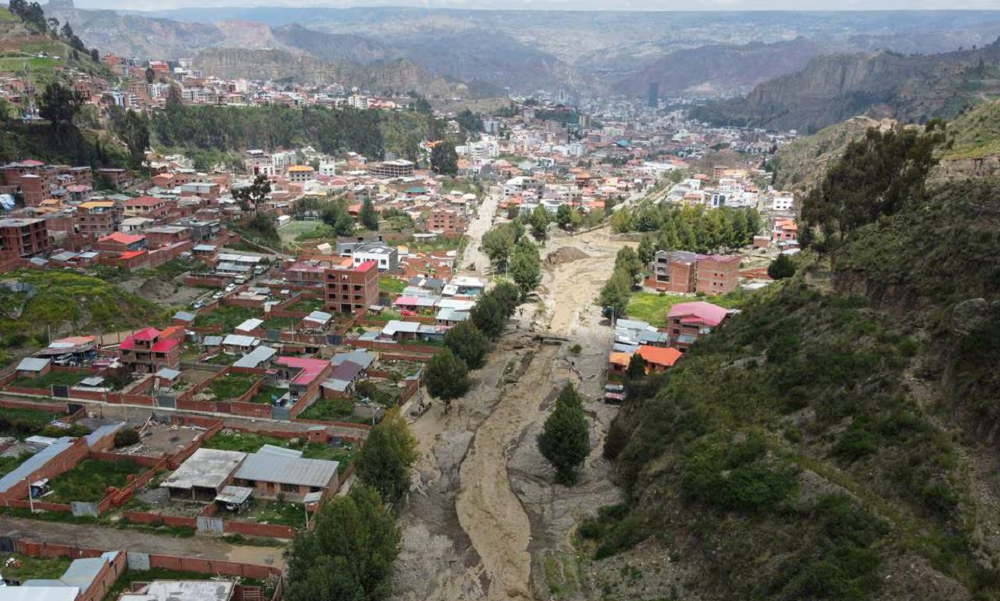Climate Change
Guterres calls for more action and leadership to deal with climate crisis

During a private meeting of Heads of State and Government, on Wednesday at UN Headquarters in New York, UN Secretary-General António Guterres called for more action and leadership to tackle the climate crisis, warning that efforts to keep the rise in global temperatures to 1.5 degrees above pre-industrial levels is “on life support”.
Speaking to journalists after the meeting, the UN chief said that he had talked to leaders about the climate emergency, and the “triple global crisis” of food, energy, and finance.
Guterres told the assembled leaders that the devastation he witnessed this month in Pakistan, where flooding covered around a third of the country at its height, occurred with global warming of 1.2 degrees; the world is currently on track for an overall increase of more than three degrees.
The meeting was billed in advance as a “frank and informal exchange” of views between leaders, co-chaired by Mr. Guterres and Egypt’s President Abdel Fattah Al Sisi, and an opportunity to address key issues ahead of the COP27 UN Climate Change conference, due to be held in the Egyptian resort of Sharm El-Sheikh in November.
Since last year’s conference in Glasgow, Scotland, climate impacts have worsened, and carbon emissions have risen to record levels, hitting vulnerable communities the hardest.
Four burning issues were addressed during the informal talks: emissions mitigation, climate finance, adaptation, and loss and damage.
On mitigation, Guterres told the leaders that although emissions must be cut almost in half before 2030, they are on track to rise by 14 percent. He called on the representatives of the world’s leading economies – the G20 nations – to phase out coal, ramp up investment in renewables, and end their “fossil fuel addiction”.
“The fossil fuel industry is killing us”, he said, “and leaders are out of step with their people, who are crying out for urgent climate action.”
Under the landmark 2015 Paris Agreement on climate change, developing countries were promised $100 billion per year to finance initiatives to help them cope with the effects of global warming.
To date, that target has not been achieved. The UN chief declared that financial commitments to the developing world must be delivered immediately, and in full.
“I emphasized the need to double adaptation support to $40 billion dollars a year by 2025” continued Mr. Guterres. “Climate destruction is happening now. People are suffering now”.
Looking ahead to COP27, the Secretary-General expressed his hope that the event will move these discussions forward, as a matter of climate justice, international solidarity and trust.
A G20 Heads of State and Government Summit will take place in Bali in November, during the last days of COP27, and Guterres urged leaders to take important decisions to tackle the “triple crisis” of food, energy and finance.
He urged international cooperation and solidarity to bring down prices that have soared since the COVID-19 pandemic and the war in Ukraine, increase support to developing countries, and prevent a larger crisis next year.
International financial institutions must also step up and offer debt relief to developing countries, declared Guterres, and new mechanisms to get resources to countries that need them should be enhanced and expanded.
Climate Change
UN sounds ‘Red Alert’ as world smashes heat records in 2023

Every major global climate record was broken last year and 2024 could be worse, the World Meteorological Organization (WMO) said on Tuesday, with its chief voicing particular concern about ocean heat and shrinking sea ice, Reuters reported.
The U.N. weather agency said in its annual State of the Global Climate report that average temperatures hit the highest level in 174 years of record-keeping by a clear margin, reaching 1.45 degrees Celsius above pre-industrial levels.
Ocean temperatures also reached the warmest in 65 years of data with over 90% of the seas having experienced heatwave conditions during the year, the WMO said, harming food systems.
“The WMO community is sounding the Red Alert to the world,” said WMO Secretary-General Celeste Saulo, who took over the job in January.
“What we witnessed in 2023, especially with the unprecedented ocean warmth, glacier retreat and Antarctic sea ice loss, is cause for particular concern.”
She later told reporters that ocean heat was particularly concerning because it was “almost irreversible”, possibly taking millennia to reverse.
“The trend is really very worrying and that is because of the characteristics of water that keep heat content for longer than the atmosphere,” she said.
Climate change, driven by the burning of fossil fuels, coupled with the emergence of the natural El Nino climate pattern, pushed the world into record territory in 2023, read the report.
WMO’s head of climate monitoring, Omar Baddour, told reporters there was a “high probability” that 2024 would set new heat records, saying that the year after an El Nino was typically warmer still.
Tuesday’s report showed a big plunge in Antarctic sea ice, with the peak level measured at 1 million km2 below the previous record – an area roughly equivalent to the size of Egypt.
That trend, combined with ocean warming which causes water to expand, has contributed to a more than doubling of the rate of sea-level rise over the past decade compared with the 1993-2002 period, it said.
Ocean heat was concentrated in the North Atlantic with temperatures an average 3 degrees Celsius above average in late 2023, the report said. Warmer ocean temperatures affect delicate marine ecosystems and many fish species have fled north from this area seeking cooler temperatures, Reuters reported.
Saulo, a meteorologist from Argentina who has promised to strengthen global warning systems for climate disasters, said she hoped the report would raise awareness of the “vital need to scale up the urgency and ambition of climate action”.
“That’s why we spoke about the Red Alert because we must care for the people and how they will suffer from these more frequent, more extreme events,” she told reporters. “If we do nothing, things will become worse and that will be our responsibility.”
Climate Change
Pakistan, India and Bangladesh bottom in air quality rankings in 2023

Pakistan remained one of the world’s three smoggiest countries in 2023, as Bangladesh and India replaced Chad and Iran, with particulate matter about 15 times the level recommended by the World Health Organization, data published on Tuesday showed.
Average concentrations of PM2.5 – small airborne particles that damage the lungs – reached 79.9 micrograms per cubic meter in Bangladesh in 2023, and 73.7 micrograms in Pakistan. The WHO recommends no more than 5 micrograms.
“Because of the climate conditions and the geography (in South Asia), you get this streak of PM2.5 concentrations that just skyrocket because the pollution has nowhere to go,” said Christi Chester Schroeder, air quality science manager at IQAir, a Swiss air-monitoring organisation.
“On top of that are factors such as agricultural practices, industry and population density,” she added. “Unfortunately, it really does look like it will get worse before it gets better.”
In 2022, Bangladesh was ranked as having the fifth-worst air quality, and India was eighth.
About 20% of premature deaths in Bangladesh are attributed to air pollution, and related healthcare costs amount to 4%-5% of the country’s GDP, said Md Firoz Khan, an air pollution expert at Dhaka’s North South University.
Indian pollution also increased last year, with PM2.5 levels about 11 times higher than the WHO standard. India’s New Delhi was the worst-performing capital city, at 92.7 micrograms.
Only Australia, Estonia, Finland, Grenada, Iceland, Mauritius and New Zealand met WHO standards in 2023.
The IQAir report was based on data from more than 30,000 monitoring stations in 134 countries and regions.
Chad, the world’s most polluted country in 2022, was excluded from the 2023 listings because of data issues. Iran and Sudan were also taken off the 2023 list.
Afghanistan was meanwhile not included on the list.
Climate Change
In Bolivia, heavy rains prompt authorities to declare state of emergency

Heavy rain in Bolivia’s capital, La Paz, prompted authorities to declare a state of emergency, a government document showed on Sunday, after overflowing rivers destroyed many houses over the weekend.
Bolivian President Luis Arce pledged to send heavy machinery and 3,000 troops to prevent further damage, according to the document, Reuters reported.
Heavy rains caused flooding in several neighborhoods and isolated parts of the city by cutting water, electricity and roads.
“We are deeply concerned by the difficult situation that our municipality in La Paz is going through,” Arce said in a post on social media platform X.
One person died over the weekend in La Paz because of the heavy rains, while nearly 50 people have died in deluges across the country since the rainy season began in January, according to official data.
-

 Sport4 days ago
Sport4 days agoACL fever grows as fixtures finalized
-

 World4 days ago
World4 days agoUS will not take part in any Israeli retaliatory action against Iran
-

 Latest News4 days ago
Latest News4 days agoOver 50 people dead in traffic accidents over Eid
-

 Latest News4 days ago
Latest News4 days agoUS identifies Kabul airport suicide bomber
-

 Latest News4 days ago
Latest News4 days agoGood rains enable DABS to increase power production in Kabul
-

 Business4 days ago
Business4 days agoAfghanistan-Kazakhstan chamber of commerce opens in Herat
-

 World3 days ago
World3 days agoIsraeli military vows response to Iran attack as calls for restraint mount
-

 Latest News3 days ago
Latest News3 days agoPakistani police give Afghans in Balochistan one day to leave
























